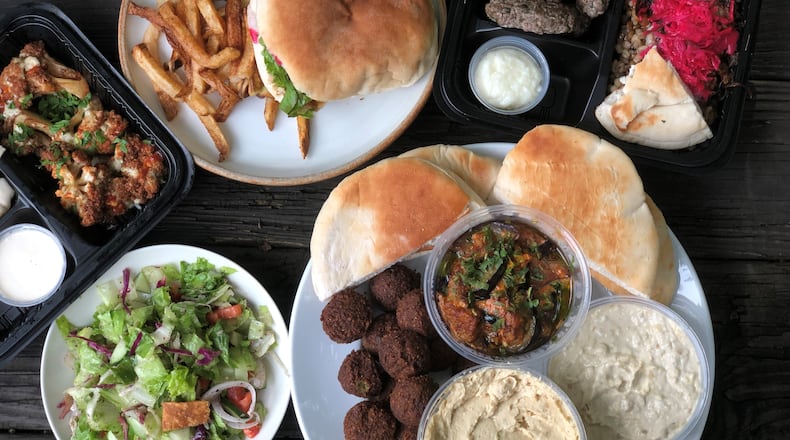When Faik Usman was growing up in Galilee, in northern Israel, everyone knew his grandma, Amoon. She was the village’s wedding caterer, famous for her braised lamb with rice, kibbeh and stuffed grape leaves. She always let her grandson eat first, before everybody else. That left an impression, naturally.
Though the matriarch passed away long ago, her spirit lives on at Usman’s Cafe Raik in Duluth. The Palestinian chef remembers learning how to make fried cauliflower, and how to season falafel and fried eggplant, from his doting grandmother.
When I chomp into his so-called “shawafel” pita sandwich — a chicken shawarma and falafel hybrid, slathered with hummus, tahini and the chef’s own dill sauce, and studded with pickle, onion, tomato, lettuce, cucumber and red cabbage — I taste Israel.
Credit: Wendell Brock
Credit: Wendell Brock
Same thing happens when I spoon into his mejadara, lentils and cracked wheat, cooked with house-made yogurt and topped with fried onions and red cabbage: My brain registers Jerusalem, where last year I enjoyed an exemplary version of this homespun, Arabic comfort food.
Though Atlanta is dotted with restaurants serving so-called “modern Israeli” cuisine, Cafe Raik offers some of the finer renditions of the everyday street food I remember from my visit. Sadly, the chef-owner said his 6-year-old fast-casual spot has been hit hard by the pandemic, causing him to cut hours, staff and menu.
“We are struggling,” said Usman, 43, the father of a 5-year-old son and 8-month-old daughter. “Unfortunately, most of the businesses around the restaurant, they work from home now.” This has taken a bite out of what was once a brisk lunchtime trade. The parking lot is emptier, the stack of rent and utility bills taller.
Credit: Wendell Brock
Credit: Wendell Brock
After learning the hospitality industry in Haifa, Israel, Usman fell in love with the U.S. when he visited his brother Ali in Michigan. He later moved to Ann Arbor, where he opened his first restaurant, Haifa Falafel, with Ali in 2010.
While in Michigan, he met his wife, Jilan, also from the north of Israel. She and her relatives persuaded him to move to Gwinnett County, where her family now lives, and to open a restaurant, because they felt their cuisine was under-represented here.
Credit: Wendell Brock
Credit: Wendell Brock
Much of Usman’s food — hummus, falafel, cauliflower, eggplant — consists of staples of what he calls “our Galilee cuisine.” He remembers his grandma made those dishes almost every day.
He chose to call his style “Mediterranean,” because he believes the term is more familiar to his audience than Middle Eastern, or Levantine, or Palestinian. Today, he believes the public is more knowledgeable about the region’s food than it was when he founded Raik. Competition is keener, too.
Credit: Wendell Brock
Credit: Wendell Brock
Right now, Raik offers only takeout, though Usman hopes to reinstate dine-in service after Labor Day. His $8 combo meals (falafel or chicken shawarma sandwiches with hand-cut fries) are a terrific bargain. If you order online, you’ll receive an email offering a 10 percent discount on your next purchase.
If you’ve never had a shawafel, now would be a good time to consider it.
Is there a restaurant you want to see featured? Send your suggestions to ligaya.figueras@ajc.com.
CAFE RAIK
Menu: Middle Eastern
Alcohol: no
What I ordered: a large order of falafel, fried eggplant, fried cauliflower and hummus; a beef kebab plate, with mejadara and fattoush salad; a shawafel in pita, with chicken shawarma and hand-cut fries. The chef threw in a small order of his baba ghanoush. Incredible! The food was every bit as good as it was when I reviewed Cafe Raik in 2018.
Service options: order takeout in person, by phone or online; delivery via Uber Eats, DoorDash, Grubhub
Safety protocols: follows standard CDC guidelines
Address, phone: 1160 Old Peachtree Road, Duluth; 770-476-7595
Hours: 11 a.m.-7 p.m. Mondays-Saturdays
Website: caferaik.com
About the Author
The Latest
Featured






